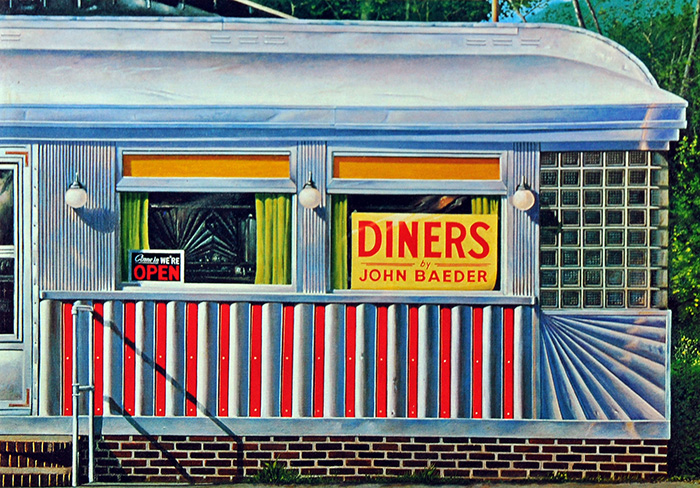Diners
Introduction by Vincent Scully
The Col. John Trumbull
Professor of History of Art
Yale University,1977
“John Baeder’s paintings seem to me to differ from most of those of his brilliant Magic-Realist contemporaries in that they are gentle, lyrical, and deeply in love with their subjects. Most of the painters of the contemporary Pop scene blow our minds with massive disjunctions, explosive changes of scale, and special kind of winkless visual focus. Baeder does not employ any of those devices. He sees everything as its own size in its proper enviroment. His diners fit ino their urban context like modest folk heroes.

Baeder is always painting a whole place. His light plays a large part in that integration of everything. It, too, is usually gentle, but most of all varied and always has a source. Sometimes it is rich, late afternoon glow with long shadows, sometimes a hot noontime blare. If there is a dull tone with no shadings it is because a gray day’s atmosphere is being made to suffuse the whole. There are night scenes. The electric light is no less lovingly painted than the sun. Because of all this, one tends to think of Baeder as a traditional colorist. He is painting landscapes not merely unified but modulated by light. Because of this, too, his work has dimensions which many of his contemporaries avoid. It is full of sense of time, including the time of history. Sloan and other Ashcan School painters may be consciously cited, as in the dusky shapes beside Empire Diner. Hopper is felt everywhere; it is a lyricism similar to his own that calls him up. But Baeder is not haunted like Hopper by a sense of something empty, hollow, and solitary in the American experience. Instead, he is youthful, hopeful, a painter-poet who makes us see the beauty of common things–not how funny they are,or how disgusting, or how powerfully expressive even, or how frightening, or just how big–but how lovely,
how seen with love. Baeder writes the same way.
We can thank our luck that human life and art constantly escape the models we construct for them. My generation excluded the vulgar Pop world, emphatically including that of the Diner, from our consideration and, by precept, from that of our children–who then grew up and took it over and wove fantasies into it and humanized it and made it art.
That is what Baeder has done. He is entirely at home in his world, and he irradiates it with light of his intelligence and with what comes through as the sweetness of his soul.”